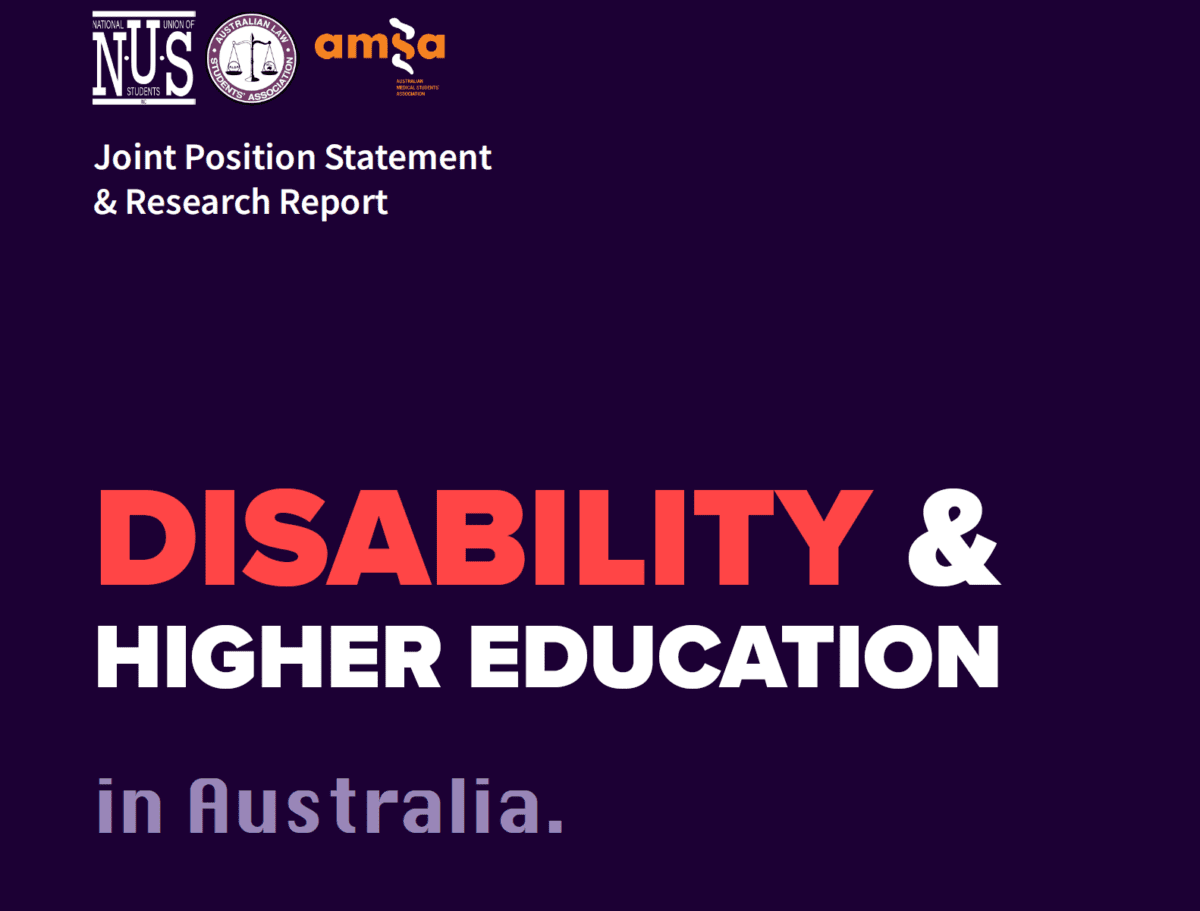The National Union of Students (NUS), Australian Medical Students’ Association and Australian Law Students’ Association have collaboratively released a damning joint position statement and research report into disability and higher education in Australia.
The report calls for serious reform to disabilities legislation and “the higher education sector at large” in order to provide equal access to education and target ableism. Delving into the inadequate understanding, training and support services surrounding disabilities in higher education, it provides a startling picture of many disabled people’s lived experiences.
It warns that higher education institutions that fail to undertake such action may be in contravention of the United Nations Convention on the Rights of Persons with Disabilities.
The ANU Disabilities Student Association (DSA) is signatory to the report, along with thirty-four other bodies or individuals. The DSA “strongly agree[s] with the proposed recommendations and urge[s] ANU, as well as other Australian tertiary institutions, to commit to implementing them.”
An ANU spokesperson has confirmed that the University is aware of the report. They added that, in conjunction with students, staff and the Disability Royal Commission report, the ANU will use the report “in determining the best way forward for the University and our community.”
The authors propose 15 recommendations, grouped into three broad issues facing disabled students and academics.
The first section highlights how ableism (the systematic exclusion of disabled people) in higher education is rife, operating through biases and the unequal provision of services. Here, the report urges stakeholder organisations (including universities) to recommend legislative reform to the government and endorse further legal suggestions from various other bodies, such as People With Disability Australia, and the National Centre for Student Equity in Higher Education.
Secondly, it describes how in the wake of the COVID-19 pandemic, targeted support for the individual needs of disabled students is critical. A “one-size-fits-all approach” has superseded specific learning accommodations and support resources, exacerbating the under-implementation of an equitable “Universal Design for Learning.”
ANUSA Disabilities Officer, Maddi McCarthy (she/her), emphasised how “ANU’s reluctance to have and maintain online tutorials makes even attending the university extremely difficult, if not impossible, for disabled students.” This echoes the report’s recommendation for universities to enhance post-pandemic learning flexibility, rather than revert “back to normal”. In semester 2 of 2022, 85% of courses were taught exclusively in-person.
The final section of the report emphasises the external barriers that exacerbate the inaccessibility of higher education. People aged 15-64 with a disability are more than twice as likely to experience financial stress as those without disability. With the financial pressures of attending university escalating, the difficulty of maintaining work, accessing support payments and meeting increased health costs compound to increase the barriers to tertiary education.
The report also highlights how the issue of sexual violence disproportionally affects disabled students, particularly those who are LGBTQIA+. It urges universities to support increased investigation and on-campus support services that are disability-informed and accessible. The Disability Royal Commission reported similar findings.
The exclusion of disabled students from tertiary education appears to be stratified even within the sector, with the “Group of Eight” universities (including the ANU) “excluding disabled students at rates higher than the sector average.”
The report argues that this underrepresentation of disabled students and staff at “elite” universities is especially problematic, as they are uniquely placed to “alleviate issues around social mobility.”
The DSA confirmed that “Several of the recommendations of this report echo the campaigns and fights the DSA has been having on campus already for the past several years.”
McCarthy emphasised that “ANU is historically quite inaccessible in a number of ways”, both physically and digitally. She stated that although she had not “necessarily experienced everything mentioned in the report personally…” she knew “of people from the collective who would be able to relate to all parts of the report.”
In the meantime, the ANU assured that it will “continue to progress its Disability Action Plan (DAP), which already addresses many of the points in the report.”
ANU’s 2020-2024 Disability Action Plan, lodged with the Australian Human Rights Commission, acknowledges that “ANU is challenged by our historical development, as we were a largely devolved institution for many years.” Hence “the frameworks for consistent action and policy implementation relating to responding to people with disability and people living with disability have not always been in place.” Yet, the plan resolves to act as the “roadmap” to ensuring ANU is an attractive and accessible physical and digital environment for both study and employment.
Specific recommendations included in the report, such as disability sensitivity training for staff members, are some of the DSA’s biggest projects.
McCarthy voiced that “There’s nothing in the report that is surprising.” It remains to be seen if the ANU, and the higher education sector more broadly, will change their models of inclusion and accessibility to student demands.
If you have found the contents of this article distressing, please use the following resources
ANU Student Safety and Wellbeing
(02) 6125 2211
ANU Disabilities Students Association
sa.disabilities@anu.edu.au
ANU BIPOC Department
sa.bipoc@anu.edu.au
ANU Indigenous Department
sa.indigenous@anu.edu.au
ANU Counselling
(02) 6125 2442
1800 RESPECT
1800 737 732
ANU Women’s Department
sa.womens@anu.edu.au
ANU Queer* Department
sa.queer@anu.edu.au
ANU Respectful Relationships Unit
respect@anu.edu.au
Canberra Rape Crisis Centre, Crisis Line
(02) 6247 2525
We acknowledge the Ngunnawal and Ngambri people, who are the Traditional Custodians of the land on which Woroni, Woroni Radio and Woroni TV are created, edited, published, printed and distributed. We pay our respects to Elders past and present. We acknowledge that the name Woroni was taken from the Wadi Wadi Nation without permission, and we are striving to do better for future reconciliation.
